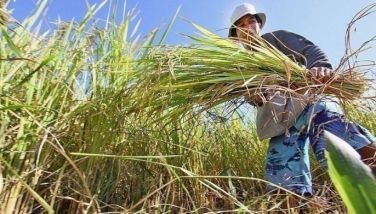Climate change linked to rise in local diseases
February 4, 2007 | 12:00am
Climate change may promote the spread of deadly diseases like malaria and asthma in both rich and poor countries by increasing the range of parasitic insects and whipping up dust from storms, environmental group Ecological Society of the Philippines (ESP) warned.
As climates warm, malaria is becoming more common in the traditionally cool mountains of Africa, Asia and Latin America where 10 percent of the world’s people live, ESP president Antonio M. Claparols said.
"Colonizers escaped from mountainous areas to avoid the swamps that bred malaria. Those areas are no longer safe." Claparols reported that malaria cases have quadrupled in the past 10 years and kill millions of people worldwide.
Scientists believe greeenhouse gases, such as carbon dioxide (CO2) released by cars and utililities burning fossil fuels, lead to climate change by trapping the sun’s heat in the atmosphere. That can lead to rising seas that may cause flooding and stronger storms. Rising temperatures increase the range of the mosquitoes and ticks that carry maladies like malaria, West Nile virus and Lyme disease, he said.
Cases of asthma, which is worsened by particulates in the air, can increase from greater amounts of CO2 , the report said. Plants high in pollen and some soil fungi grow better with higher levels of the gas.
In addition, climate change’s stronger winds increase the amount of dust in the air from expanding deserts, which compound the effects of air pollutants and smog from the burning of fossil fuels as well as the risk to asthma sufferers.
As climates warm, malaria is becoming more common in the traditionally cool mountains of Africa, Asia and Latin America where 10 percent of the world’s people live, ESP president Antonio M. Claparols said.
"Colonizers escaped from mountainous areas to avoid the swamps that bred malaria. Those areas are no longer safe." Claparols reported that malaria cases have quadrupled in the past 10 years and kill millions of people worldwide.
Scientists believe greeenhouse gases, such as carbon dioxide (CO2) released by cars and utililities burning fossil fuels, lead to climate change by trapping the sun’s heat in the atmosphere. That can lead to rising seas that may cause flooding and stronger storms. Rising temperatures increase the range of the mosquitoes and ticks that carry maladies like malaria, West Nile virus and Lyme disease, he said.
Cases of asthma, which is worsened by particulates in the air, can increase from greater amounts of CO2 , the report said. Plants high in pollen and some soil fungi grow better with higher levels of the gas.
In addition, climate change’s stronger winds increase the amount of dust in the air from expanding deserts, which compound the effects of air pollutants and smog from the burning of fossil fuels as well as the risk to asthma sufferers.
BrandSpace Articles
<
>
- Latest
Latest
Latest
November 9, 2024 - 3:43pm
By E.H. Edejer | November 9, 2024 - 3:43pm
June 9, 2024 - 5:55pm
By Alberto Peña | June 9, 2024 - 5:55pm
May 24, 2024 - 10:00am
May 24, 2024 - 10:00am
May 14, 2024 - 3:43pm
By Ian Laqui | May 14, 2024 - 3:43pm
April 10, 2024 - 5:12pm
By Ian Laqui | April 10, 2024 - 5:12pm
Recommended



























